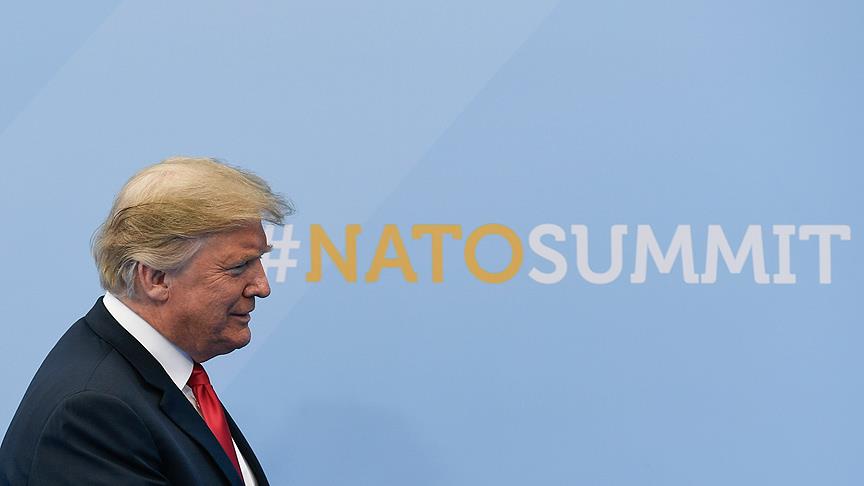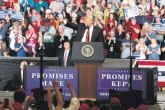The NATO summit in Brussels this week will be one of the most critical meetings of the organization in the post-Cold War period. In addition to challenging problems that the organization is facing, including cyberwarfare, countering terrorism and the state of relations with Russia, what makes the most significant collective security establishment of the world particularly nervous nowadays is the relation of the U.S. with its European allies and its approach to NATO.
It was only last month that U.S. President Donald Trump generated serious tension in the G7 meeting, by arriving late and departing early. He also tweeted harsh words about the host of the summit, the prime minister of Canada, after his departure from Canada, and refused to sign a joint statement. And in the first NATO summit he attended last year, he showed signs of discomfort at being there and also harshly criticized NATO members for not contributing enough towards the NATO budget. Yet once again, before the NATO summit there are a lot of questions and concerns in regards to President Trump’s attitude towards NATO and its members.
The first signs of this nervousness took place with President Trump’s speech in Montana this week. As he had done before he again criticized some governments in Europe for failing to fulfill NATO’s criteria of spending two percent of their budget for defense purposes. He particularly targeted the German government for failing to adopt this. President Trump openly said that “You know, Angela…we are protecting you and it means a lot more to you…because I don’t know how much protection we get by protecting you.” He also accused Merkel of pursuing oil and gas deals with Russia while asking the U.S. to protect it from Russia.
This has become one of the most divisive issues for the alliance. But it is not the only problem. The unpredictability of Trump’s style and uncertainty about the plans of the U.S. for the future of NATO will make it harder for European countries to communicate with President Trump during this summit and most probably thereafter. So far to try to change the behavior of President Trump through effective communication has failed to produce results. As it may be recalled in the last few months the very high level summit between Trump and Macron and between Trump and Merkel failed to change the mind of President Trump in regards to the plans of imposing tariffs on goods from Europe.
In addition to that there is a sense of anxiety about Trump’s relation with Russia. The Mueller investigation and the rumors about some members of the Trump campaign’s relations with Russia have been closely followed by public opinion. The European governments are also curious about the road map of U.S. foreign policy in regards to its relation with Russia. The fact that President Trump avoided criticizing Putin since he came to power is one of the reasons provided by some individuals to demonstrate the proximity between Trump and Russia. Making things more critical for the countries that express a certain level of concern about U.S.-Russia relations, President Trump will meet President Putin following the end of the term.
Of course there are other issues that raise questions about U.S. foreign policy. The leaked conversations of President Trump in which he asks the feasibility and cost of the high degree of withdrawal from Europe is one such matter. Although this was not confirmed by members of the administration, the fact that it was leaked to the press demonstrates a certain degree of thinking about that. Another not well-pronounced concern is in regards to the cooperation of some Trump campaign representatives with ultra-rightist parties in Europe. Some of the European countries are warning of the potential outcomes of such coordination to the political system of Western democracies.
This meeting will be critical because the outcome of this meeting will demonstrate whether the U.S. will continue to commit for the security of its allies and whether the allies are ready for an international system in the absence or reluctance of the U.S. Transatlantic relations may gain new meaning or have a new beginning following the completion of the NATO summit.
[Daily Sabah, 8 July 2018]
In this article
- Opinion
- 2018
- Canada
- CENTCOM
- Cold War
- DAESH
- Daily Sabah
- Donald Trump
- East of the Euphrates
- Emmanuel Macron
- Europe
- Fight against DAESH
- French President
- Kurdistan Workers' Party Terrorist Organization (PKK)
- Middle East
- NATO
- NATO Ally
- NATO Summit
- Operation Euphrates Shield
- Peace Corridor
- People's Protection Units (YPG)
- PKK - YPG - SDF - PYD - YPJ - SDG - HBDH - HPG - KCK - PJAK - TAK - YBŞ
- Prime Minister
- Russia
- Safe Zone
- Syria
- Syrian Civil War
- Syrian Conflict
- Syrian Crisis
- Syrian Democratic Forces (SDF)
- Syrian National Army (SNA)
- Syrian National Coalition
- Syrian Opposition
- Syrian Refugees
- Terrorism
- Trump’s Syria Withdrawal
- Turkish Foreign Policy
- Turkish-American Relations
- Türkiye-US Relations
- Türkiye-US Security Relations
- Türkiye's Foreign Policy
- Türkiye's Operation Peace Spring
- Türkiye’s Operation Olive Branch
- United States (US)
- US Foreign Policy
- US President
- US Withdrawal from Syria
- US-PKK/PYD/YPG/SDF Relations
- US-Terror Relations
- Vladimir Putin
- Western World



